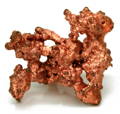Why is it important to take a copper supplement together with zinc?
The body uses copper in energy production and to support bone, skin, neurological, and cardiovascular health. Although copper deficiency is rare, copper deficiency can result from high levels of zinc intake as zinc decreases the body's ability to absorb copper from the diet.
In this article we will explore the pathways that can lead to copper deficiency and what you can do to maintain healthy copper levels in your body while taking zinc supplements.

The Short Answer.
-
Balancing zinc and copper levels in the body is critical for health
-
Doctors recommend that you take 2-4 mg of copper along with any zinc supplement.
What role does copper play in the body?
How much copper do we need? How much do we get from an average diet?
How does zinc supplementation effect copper absorption?
Copper and Sperm Health: The role of copper in male fertility
Copper plays a very important role in male fertility. It is an essential element for the production of sperm (5). Copper-dependent enzymes are present at all stages of sperm development and are present within the cells of the testes. Copper deficiency leads to a significant reduction in male fertility (5).
Taking a copper supplement is a cheap and effective way to maintain your copper levels in the correct range and maintain sperm health. Load Boost contains 4 mg of copper per serving and contains a blend of high-quality, natural ingredients that promote sperm health, improve prostate health, and increase semen volume.
1. “Precious Metals and Other Important Minerals for Health.” Harvard Health, 15 Feb. 2021, https://www.health.harvard.edu/staying-healthy/precious-metals-and-other-important-minerals-for-health.
2. National Research Council (US) Committee on Copper in Drinking Water. Copper in Drinking Water. Washington (DC): National Academies Press (US); 2000. 2, Physiological Role of Copper. Available from: https://www.ncbi.nlm.nih.gov/books/NBK225407/
3. "Copper: Fact Sheet for Health Professionals" National Institute of Health, 29 March 2021, https://ods.od.nih.gov/factsheets/Copper-HealthProfessional/.
4. "Zinc" Mount Sinai Health System, 5 April 2022, https://www.mountsinai.org/health-library/supplement/zinc
5. Ogórek M, Gąsior Ł, Pierzchała O, Daszkiewicz R, Lenartowicz M. Role of copper in the process of spermatogenesis. Postepy Hig Med Dosw (Online). 2017 Aug 9;71(0):663-683. doi: 10.5604/01.3001.0010.3846. PMID: 28791960
The Vitaliboost Health Guide
